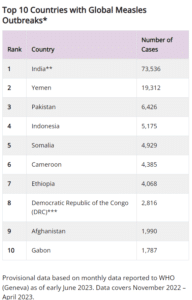The impact of the pandemic on measles vaccination is evident, with over 61 million doses of measles-containing vaccine being postponed or missed because of delays in supplementary immunization activities
HealthLEADS Desk
Measles is becoming a concern for countries worldwide. The suspension of immunization services during the COVID-19 pandemic, coupled with anti-vaccination sentiment, has left millions of children vulnerable to preventable diseases like measles.
The World Health Organization (WHO) Director-General, Dr. Tedros Adhanom Ghebreyesus, has highlighted the increasing number of measles outbreaks globally, along with other health emergencies.
“We are dealing currently with 56 graded health emergencies around the world and of those, 14 are grade 3 which is our highest grade of emergency,” Dr Tedros Adhanom Ghebreyesus, WHO Director-General said early this year.
“We’ve over 24 outbreaks of cholera going on in many countries, particularly in Africa and I think anyone who works right now on immunisation will see a huge increase in measles outbreaks we are seeing around the world so, the world is not quiet from the point of view of infectious diseases, nor other health emergencies,” he added.
The impact of the COVID-19 pandemic on measles vaccination is evident, with over 61 million doses of measles-containing vaccine being postponed or missed due to delays in supplementary immunization activities. This poses a risk of larger outbreaks worldwide, including in the United States. In 2021 alone, 25 million infants missed at least one dose of measles vaccine through routine immunization.

Last year in November, a combined report from two major public health bodies, the Centre for Disease Control and Prevention (CDC) and the World Health Organisation (WHO), declared measles an “imminent threat” to the global community. The CDC and WHO feared that a record decline of measles vaccination rates and persistent large outbreaks meant that the respiratory virus was an “imminent threat in every region of the world”.
Turkey
Turkey has been facing serious levels of measles cases after the COVID-19 pandemic. Experts attribute the increase in measles cases to anti-vaccination sentiments against COVID-19 vaccines prevalent in society. The Turkish Medical Association (TTB) has repeatedly called on the government to address the measles outbreak by increasing vaccination rates and improving healthcare access.
In 2020, the Turkish Medical Association (TTB).called on the government to take urgent steps to address the measles outbreak, including increasing vaccination rates and providing better access to healthcare. In 2022, the TTB reiterated its call for urgent action on measles, noting that the outbreak had continued to grow and that thousands of people had been infected.
The TTB has also published a number of fact sheets on measles, including information about the symptoms, transmission, and prevention of the disease. It says measles is a highly contagious disease that can cause serious complications, including pneumonia, encephalitis, and death. As vaccination rates in Turkey are low, which is contributing to the measles outbreak, the TTB says, the measles vaccine is safe and effective, and it is the best way to protect yourself and your children from measles.
The United States
Even in the United States, where measles was declared eliminated in 2000, outbreaks have been on the rise. In 2019, nearly 1,300 cases of measles were reported in 31 states, the highest number since 1992. These outbreaks were linked to travel-related cases reaching at-risk populations with low vaccination rates.
According to the U.S. Centers for Disease Control and Prevention (CDC), although measles was declared eliminated in the United States in 2000, almost 1,300 cases of the disease were reported in 31 states in the US in 2019— the greatest number since 1992. The 2019 US measles outbreaks were all linked to travel-related cases that reached at-risk populations (un or under vaccinated against measles) in the United States.
A Lancet article titled, “the challenges in the monitoring of infectious diseases after the earthquake in Türkiye in 2023” published on July 4, 2023 highlighted the challenges in monitoring infectious diseases after the earthquake in Turkey and Syria in 2023. The unsanitary living conditions, interrupted healthcare services, and inadequate access to clean water and sanitation have contributed to the spread of infectious diseases, including measles.
India
India has experienced the highest number of measles cases, with over 9,000 reported from April to September 2022, according to recent data. Following closely behind are Somalia with 8,435 measles cases and Yemen with 6,478 cases. Pakistan ranks seventh on the list with 3,635 cases.
During the period from October 2021 to September 2022, there were 172 confirmed measles outbreaks, resulting in a total of 12,589 cases.
The concerning aspect is that the vaccine coverage against measles in India stands at only 66 percent, and in many states, it is even below 50 percent.
Maharashtra, a state in India, reported the highest annual caseload of measles last year. Officials attribute this to the outbreak in the state, particularly in the financial capital, Mumbai. The number of cases in Maharashtra increased from 452 in 2020 to 722 in 2021. However, in 2022, there was a significant eight-fold rise, with cases skyrocketing to 2,692. Gujarat followed closely behind with 1,672 cases. Dr. Bharati Pravin Pawar, Minister of State for Health and Family Welfare, presented the data in the parliament.
A recent article in Gavi, the Vaccine Alliance, a public-private partnership focused on vaccinating children against deadly diseases, says COVID had the highest impact on India’s immunization system. Gavi states that by 2021, coverage with the third dose of basic vaccines for diphtheria, tetanus, and pertussis had decreased by 6 percent compared to 2019 levels. This decline resulted in an estimated 3.5 million children in India missing out on vaccination, accounting for nearly 15 percent of the global total. The number of children lacking protection from even a single vaccine rose from 1.38 million two years ago to 2.71 million.
India has said the country is committed to measles elimination and rubella control. The MR vaccine was introduced in the country through a phased campaign in 2017, targeting around 41 crore children. Two doses of the vaccine are recommended for optimal protection.
COVID-19 increases risk of measles outbreak
The COVID-19 pandemic has led to the postponement or cancellation of measles campaigns in many countries, further exacerbating the situation.
Measles is a highly contagious and serious viral disease that can lead to severe complications and even death. Vaccination has been crucial in reducing measles-related deaths globally. However, the COVID-19 pandemic has disrupted routine vaccination services, affecting global progress in measles elimination.
Ensuring that every child and at-risk group member receives the recommended doses of measles vaccine is vital in the global effort to eliminate measles and control rubella. Vaccination remains the best defense against measles and other vaccine-preventable diseases, and achieving high vaccination coverage is crucial for public health.
WHO strategy
In 2020 WHO published the Measles and rubella strategic framework report. The report said the COVID-19 pandemic, which started in late 2019, led to an interruption of routine vaccination services in many countries and cancellation or postponement of planned immunization.
In 2021, 71 percent of children received both doses of the measles vaccine, and about 81 percent of the world’s children received one dose of measles vaccine by their first birthday, the lowest since 2008. Two doses of the vaccine are recommended to ensure immunity and prevent outbreaks, as not all children develop immunity from the first dose.
WHO says accelerated immunization activities by countries, and other international partners successfully prevented 56 million deaths between 2000-2021. Vaccination decreased measles deaths from 761 000 in 2000 to 128 000 in 2021.
Measles and migrations
In India’s Maharashtra state, health officials say most of the state’s measles cases have been detected in children of migrant parents who were forced to move cities during the pandemic.
COVID had disrupted routine vaccination drives in many cities of the country, but health officials said migration made health tracking of children even more difficult. Thousands of these children likely missed doses of the MR vaccine, they added.
In a recent tweet, Turkish Minister of Health Fahrettin Koca said 95 percent of the country was vaccinated against measles and nearly 92 percent among migrants. The minister also called on families to vaccinate their children.
Koca has dismissed the recent surge in measles cases as not constituting an “outbreak,” noting that the cases were concentrated in İstanbul.
“There is no outbreak situation; it is under control. We are implementing the necessary treatments for all identified cases, and our contact tracing efforts are being conducted rigorously,” he said.
“We have regional cases, with İstanbul being the most affected area. 86% of the cases are concentrated in Istanbul. However, as I mentioned, the situation is under control, and we are closely monitoring it with our mobile health teams,” he added.
In the United States, President Donald Trump in 2019 blamed the measles outbreak in New York City on immigrants from abroad. He said that the immigrants were not vaccinated against measles and that they were putting the American people at risk.
In India, Health Minister Harsh Vardhan in 2020 blamed the measles outbreak in the country on unvaccinated migrants from Nepal.
In Europe, the Prime Minister of Hungary, Viktor Orbán in 2021 blamed the measles outbreak in the country on migrants from Syria and Iraq. He said that the migrants were not vaccinated against measles, putting the Hungarian people at risk.


















Add Comment